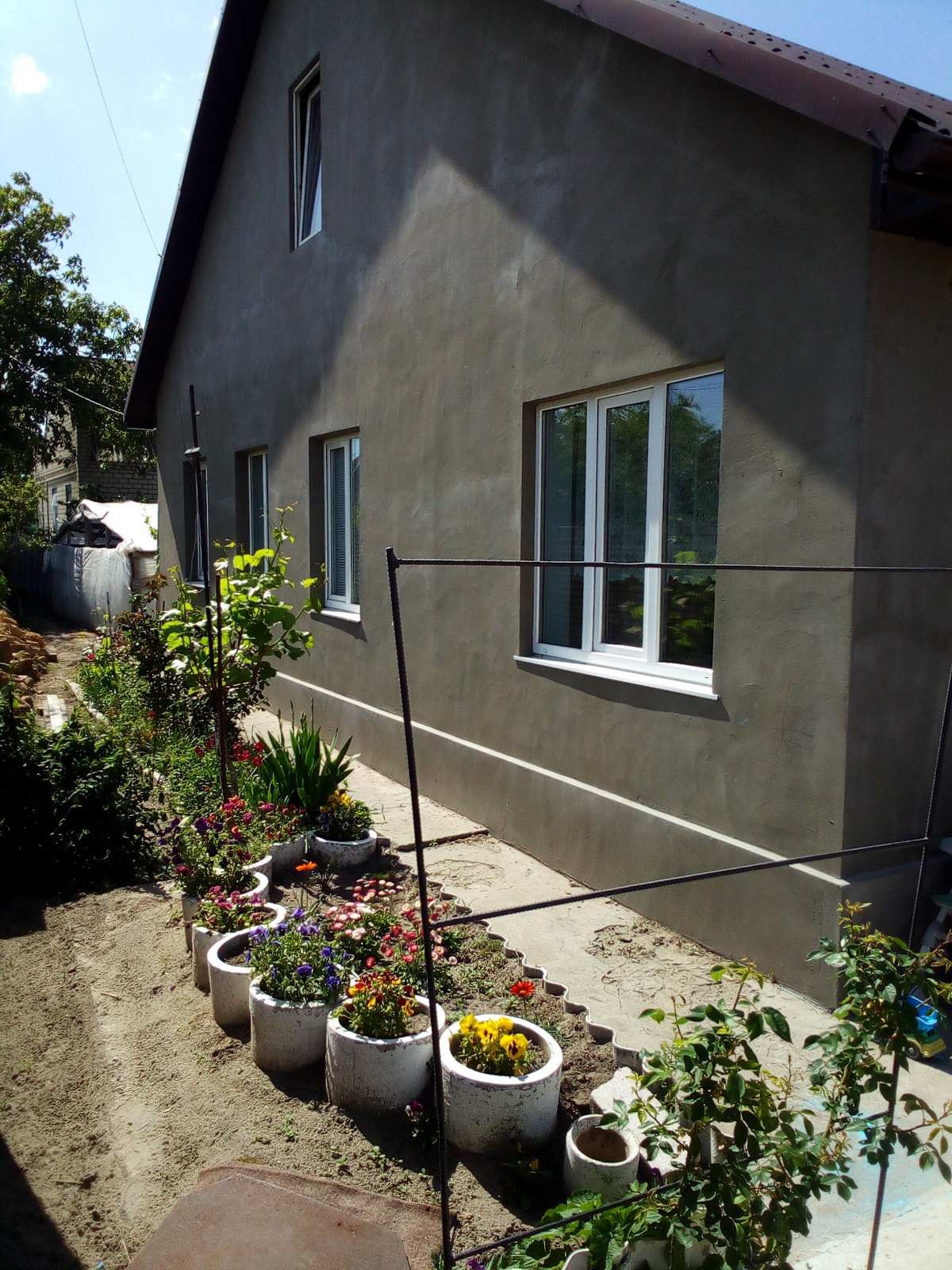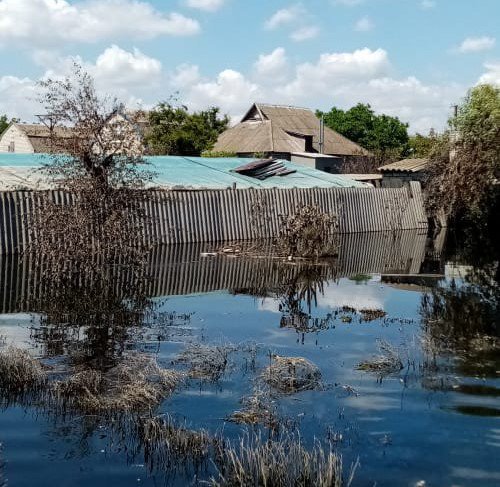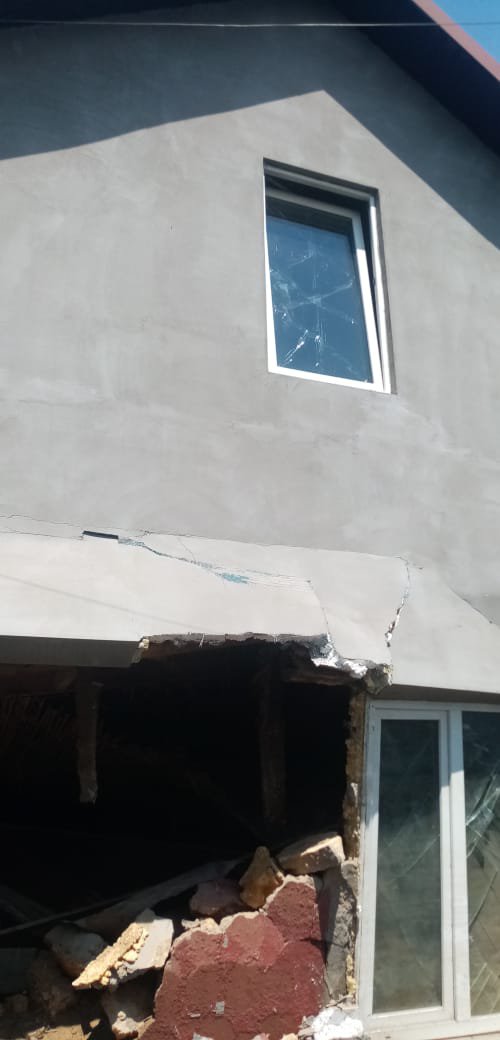A genocidal war. How the Russians saved their own people and did not let the Ukrainians save themselves in Oleshky
Natalya Skakun, a resident of Oleshky in her recent life, now lives with her daughter in Mykolaiv with her husband. We start a conversation, and we can see almost immediately that Natalya is still in a state of shock. As she recounts her experience, her voice begins to tremble at some point.
Translated by Dmitry Lytov and Mike Lytov.
Читати українською
Although she and her husband managed to escape the flood and the Russians and made their way through the whole of Europe, memories of what they experienced do not leave her even now. But when it comes to her plans, her voice sounds firm - she plans to return to her home town of Oleshky.
Natalya Skakun:
"My son called me early in the morning. He works in Kherson, and he said that the Kakhovka HPP was blown up, and we must leave. But we thought that the water would not rise much, about a meter and that's all. We expected that the flood would start, as it always happened, from the Chaika River (which flows on the western outskirts of Oleshky - TEXTY). But the water came from the Dnipro from a completely different side. We live on the outskirts, and it came from the side of the ponds. And many people who, like us, did not expect that the water would come from there, were simply cut off, there was no way to leave by car.
We started rescuing all our livestock, dogs, cats, rabbits, chickens, and put them all in the attic. We still thought, well, it would rise a little more and fall. We sat in the attic, and the water kept coming - ten centimeters (4 inches) every ten minutes. Around eight o'clock in the evening, the water rose almost to the attic - three meters (10 feet) high. And the next day, when we were already practically swimming in it, half of the roof of our house was already underwater. Our roof itself is three and a half meters (>12 feet) high.
It was already night, everyone continued to sit in their attics, it was impossible to call someone, and the rescue service (Russian - TEXTY) did not accept calls. Someone, it seems, did call the Russian Ministry of Emergencies, and they said "Wait, we have received many calls" and that was it.

Night was coming, it was very cold and scary. Cows floated in the water, they mooed, some of them drowned. By chance, we saw a neighbor, he picked us up in his boat. There is a shop in our neighborhood, which was not covered in water yet, and we rowed to it for three hours, because the current was very strong, and we only got there at night. Then we wanted to row back, and asked people to take us in a boat. There are people in our town who worked for the Russians, and those were evacuated on row boats and motorboats. And none of them agreed to give us a boat. I don't know how they will look people in the eyes later.
It seems that the water did not rise during the night, and in the morning, it started coming again, and it continued to flood Oleshky. At four in the morning, our neighbors reached us by phone. They said that they were floating on a mattress with a dog, and the current brought them onto the roof of someone's house. They asked to be rescued. And there was another guy sitting on the roof, a neighbor. Then my husband and I took this neighbor's boat, tied another rubber boat to it and rowed to them to rescue them. We had no oars, so we rowed with boards.
It took us three hours of rowing to get there. We got to one neighbor, left him a rubber boat, and then went for another neighbor. And then we also picked up my sister. She was sitting all blue, shivering, wet; if we hadn’t taken her away, she probably wouldn't have survived, because she already started to cramp. She said that a pig tried all night to climb on the roof where she was sitting and almost drowned her.
And the neighbor's old woman did drown. When a neighbor was picking us up, her sisters somehow managed to pull her onto the roof, and she was sitting there. And the next day, when we were rescuing the neighbors, only her head was sticking out of the water, and she didn't react in any way. It seems she was dead. We could not get closer, our boat was completely packed, and if we tried to pull her, we would capsize.
I am certainly unable to tell you how many people died. But I am sure there were many. As soon as we left Oleshky, I talked to people, and many of them had a relative or a neighbor who had drowned. They say that some children also drowned. There are also many whose fate is unknown.
And the water continued to come. And we ran further - first to the city center, there was still a piece of land there, when everything around was already flooded. All surrounding villages were also flooded – Kozachi Lageri, Krynka.
On the second day, the Russians came to rescue their own soldiers; some of them were still stationed here and there when the flood started, they were wading up to their necks in water. The rescuers saved in the boats that the Russians had not yet taken away, for two or three days. And then they started taking out the corpses.

The Russians also set up roadblocks and did not let anyone near the water. They said that they were expecting an attack by the Ukrainian SRG (sabotage & reconnaissance groups). Then our guys found some kind of loophole, and managed to get out from one street, gathering people. And on all the other streets, where the water came, the Russians set up their block posts.
From what I heard from acquaintances, many houses in Oleshky are now destroyed by water. In the houses that survived, Russian soldiers with machine guns are now sitting in their attics. There is nothing to eat. People are looking for some snacks, canned goods in the destroyed houses. Volunteers help, but there are a lot of people who are left with nothing. The elderly and children have also left, and people do not have the money to leave.
We spent the night with friends and the next day we still managed to break out of Oleshky through Proletarka (the Russian name of the village of Chelburda - ed.). We sat there for two days, while the children collected funds for our trip through Facebook. It was possible to leave only in the direction of Skadovsk - Armyansk and further to Russia. From here, the Russians already organized evacuation of those who decided to move to live with them. These were mainly those who received Russian passports, they were sent either to the Krasnodar or Krasnoyarsk regions, where they were promised to be provided with some kind of housing.

Of course, we didn't want to go anywhere in Russia to live, so we started planning how to go to the West through Russia, and then return to Ukraine again. The children hired some carriers, somehow transferred money to their cards, and then we left. First, we got to Armyansk (in Crimea), where the Russians still have border control, crossed the customs on foot, and then got on a big bus. We entered Armyansk at eight in the morning, and left at two in the morning. All this time we spent at customs, filled out questionnaires, had our luggage thoroughly examined, and then each of us was called to the office by name and questioned.
"Well, you’ve been waiting a while, and they [Ukrainian troops] never came? And where will you go now?" - that's what they told us during the interrogation. Of course, we made something up, we couldn't say that we wanted to return to Ukraine. They checked our phones, especially the younger ones. I have only flowers or grandchildren in my phone, but on my man’s phone, they found a post, either from 2020 or 2021, for which they wanted to detain him. And later, when we were traveling through Russia, one young guy was detained, so we left without him. He seems to have been from Kakhovka or Krynky.
We traveled through Russia for two days, passed through Rostov-on-Don, Moscow and through the outskirts to the Latvian border. We stopped mostly at gas stations; the attitude was different there. Some accepted us, and at some gas stations, when we arrived, the notice "Closed for maintenance" was posted, and we were not even allowed to go to the toilet.
Once we got to the Russian-Latvian border, we spent the whole night there, until the Russians let us go. We sat on pallets near the swamp, swarmed by mosquitoes. When we crossed the border, the Latvian volunteers fed us, gave us water, and we went on to Warsaw. From there, we were able to get back home quickly. One Polish customs official was surprised, could not understand how we from Ukraine are going across the world to Ukraine again. He asked: "Where are you coming from? From Ukraine. And where are you going? To Ukraine". For an outsider, it really sounds strange. From Ukraine to Ukraine. But we finally made it".
TEXTY hope that the testimony of this woman from Oleshky, as well as other witnesses of this disaster, will become the basis for the preparation of charges against the Russians for crimes against humanity. Since in this case, their actions - the selective rescue of only Russian soldiers and collaborators, the prevention of local residents to access the site of a natural disaster, which is reminiscent of the practice of the Holodomor times, the blocking of attempts to rescue victims, filtering and repressive measures - all this is another piece of evidence of attempts to destroy all Ukrainians, i.e. genocide.

